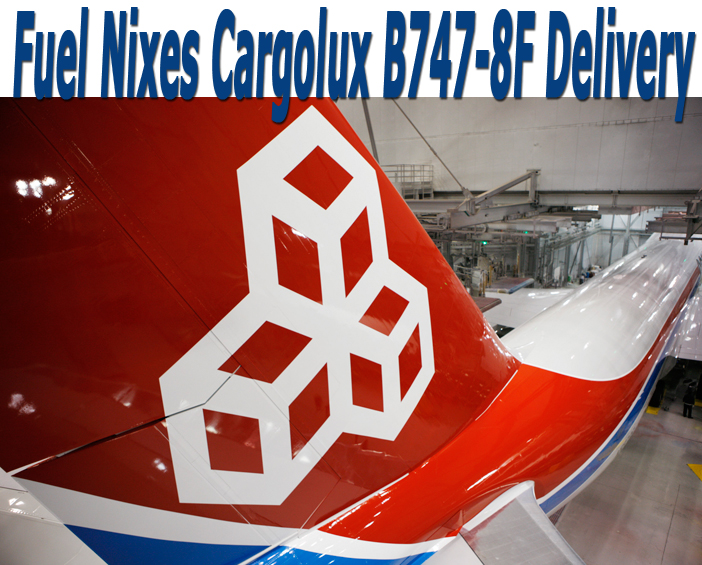
Cargolux, the all-cargo
airline that grew out and up from tiny Luxembourg has a proud tradition
of pioneering firsts including being the first carrier worldwide to
operate the B747-400 cargo airplane 18 years ago.
As you read this, this week on
Monday September 19, Europe’s largest all-cargo airline was
to have launched a new era for air shippers and a new chapter in its
great contribution to air cargo, as the launch airline to receive
the first new-generation 747-8 F aircraft.
But all of that was put on hold
late last week, as Cargolux refused to accept the aircraft citing
“contractual issues” that compelled its board, to reject
the planes.
According to sources, the Cargolux
board shut down the deal because the fuel burn of the GE-manufactured
turbines was not in accordance with the performance guaranteed by
Boeing to Cargolux when the order for the B747-8Fs was signed.
Sources say that the Qatar Airways
faction within the Cargolux board of directors impacted blowing off
the deal. Last June Qatar Airways purchased 35 percent of Cargolux
from local Luxembourg banks and financial institutions.
By way of background, airlines
and manufacturers generally agree on a binding permanent improvement
program weeks if not months prior to the first delivery of a plane.
The agreement contains a firm
deadline upon which all performance and other technical or organizational
items have to be straightened out.
If this fails to occur, the carrier
can reject the acceptance of the aircraft.
The 747-8 freighter won certification last
month from the U.S. Federal Aviation Administration to enter commercial
service. But Boeing is two years late with this airplane that so far
has only delivered a reported $2.04 billion cost overrun at Boeing.
Added to the B787 fiasco, right
now with a three-day party all set up to celebrate B747-8F that the
guest of honor refuses to attend, Boeing looks like the gang that
can’t shoot straight, let alone build airplanes.
There is also the specter of an
embarrassing first for these type of things—an aircraft delivery
all set to go with even some revenue cargo booked to fly—that
didn’t happen.
“We continue to work with
Cargolux and look forward to delivering its airplanes,” was
about all Boeing could come up with as an excuse.
Financing, secured through JPMorgan,
was put on hold, Cargolux said Friday.
“In the event that the issues
cannot be resolved in a timely manner, Cargolux will source alternative
capacity to fully meet customer demand and expectations ahead of the
traditional high season,” the company added.
“It’s horrendous,”
Ken Herbert, an analyst with Wedbush Securities in San Francisco,
told Bloomberg News.
“Just when you finally thought
they (Boeing) were going to turn the corner, this happens.”
Earlier Air Cargo News Flying
Typers spoke to Frank Reimen, Cargolux President and Chief Executive
Officer.
 |
Mr. Reimen was
enthusiastic about Cargolux operating the B747-8F, which if nothing
else indicates that once the impasse is cleared, focus will return
to the efficiencies that the three aircraft scheduled (hopefully)
to enter the Cargolux fleet this year will bring.
“We have eagerly anticipated
the first 747-8 delivery for a long time, because this aircraft will
help us to improve our economic performance through higher payloads
and lower unit costs.
“The 747-8 freighter represents
a new benchmark in fuel efficiency and environmental performance.”
It upholds its predecessor’s
efficiency, with nearly equivalent trip costs and roundabout 15% percent
lower ton-mile costs.
Added to that, the 747-8F improves
on the environmental record of the 747-400F with further reduced fuel
consumption and lower CO2 emissions, well below ICAO limits. Applied
to Cargolux’s operation, this represents a saving of up to 400,000
tons of CO2 per year.
“After we receive the first
three out of a firm order of 13 aircraft, Cargolux will see four additional
deliveries in 2012.
“Initially, we will deploy
the new aircraft on our routes to Asia. The aircraft will not change
our business; it will rather support it. That was in fact one of the
reasons why we selected the 747-8. It fits into our network because
it has a similar range as the 747-400, but with improved capabilities.
The most important aspect is that the 747-8 Freighters will make our
business model more economical because of lower unit costs.
“It is a real game changer
and will boost our position as a leading air cargo carrier. So at
the end of 2011, we will operate the three new 747-8Fs plus our remaining
13 747-400Fs.”
We wonder about the business climate
in 2011 and ask Mr. Reimen what lies ahead in 2012.
“The year of 2011 has been
difficult so far, capacity growth has exceeded demand by quite a margin
and this has continued throughout the summer.
“It has naturally put load
factors under pressure.
“And even though the industry
sees a slight improvement in demand in the markets, our profit margins
have come under pressure in the first half of the year, also driven
by extra wet-leased capacity we had to bring in to cover our network
while awaiting the B747-8’s.
“Fuel prices remain very
high; they are still almost 50% above the second quarter 2010 level,
which is denting our results, too.
“The overall air freight
market showed a small decline in July compared to July 2010, so it
is basically stagnant.
“The Asian export business
in particular has been hurt. Current situation can, to a certain extent,
be attributed to the earthquake and tsunami in Japan, and most of
all is due to the general economic gloom which causes general caution
to ship goods to markets.
"We have to live with the
current economic difficulties for almost a whole year now. What matters
most in our business is the supply/demand ratio. Ensuring network
management and fleet size/capacity flexibility whilst keeping your
head cool is the best recipe to manage a downturn."
But on the brighter side Frank
notes:
“At this moment, South America
is strong, in particular Brazilian imports. We see a similar situation
for Africa imports. Unfortunately, exports from there are not keeping
up the same pace.
“Imports and exports to
the USA are looking reasonably good, but it’s certainly not
a ‘pot of gold’ over there.
“Through our partnership
with Qatar Airways, we have the chance to expand our destination network.
Due to the complimentary nature of our networks and fleet structure,
we will strengthen the respective hubs in Luxembourg and Doha. The
Qatar deal will, in essence, give us further access to Central and
East Asia.”
We wonder, as an innovator if
Cargolux has ever considered utilizing other aircraft?
“We have looked at other
aircraft models throughout the years,” Frank Reimen says.
“We had offers for the
MD-11 freighter, we were active in the A380 freighter project, we
looked closely at the 777F, which would also have been an interesting
aircraft.
“But in the end, the 747
fits our route structure and our business model best and we pushed
Boeing to go ahead with the 747-8.
“A single-type fleet is
more attractive for us because more aircraft types translate to more
complexity and higher maintenance costs. Boeing has stated that, without
Cargolux, there would probably be no 747-8.
“And it is interesting to
see that, for the first time ever, Boeing has developed the freighter
version of an aircraft before the passenger version."
In terms of what Mr. Reimen views
as the most important challenge to the global air cargo business?
“The most important challenge
is to deal with the rapid, short cycles that occur at the moment.
Markets go up and down quickly - like never before. So, adjusting
the network is a permanent challenge for us.”
Geoffrey Arend/Heiner Siegmund
|


